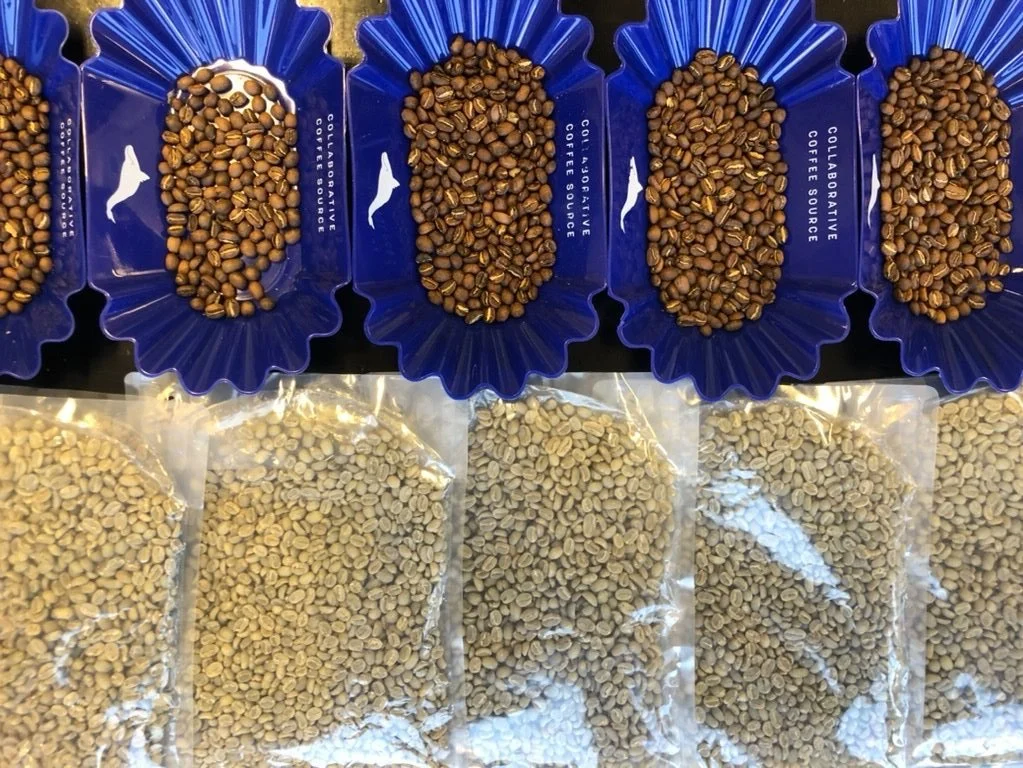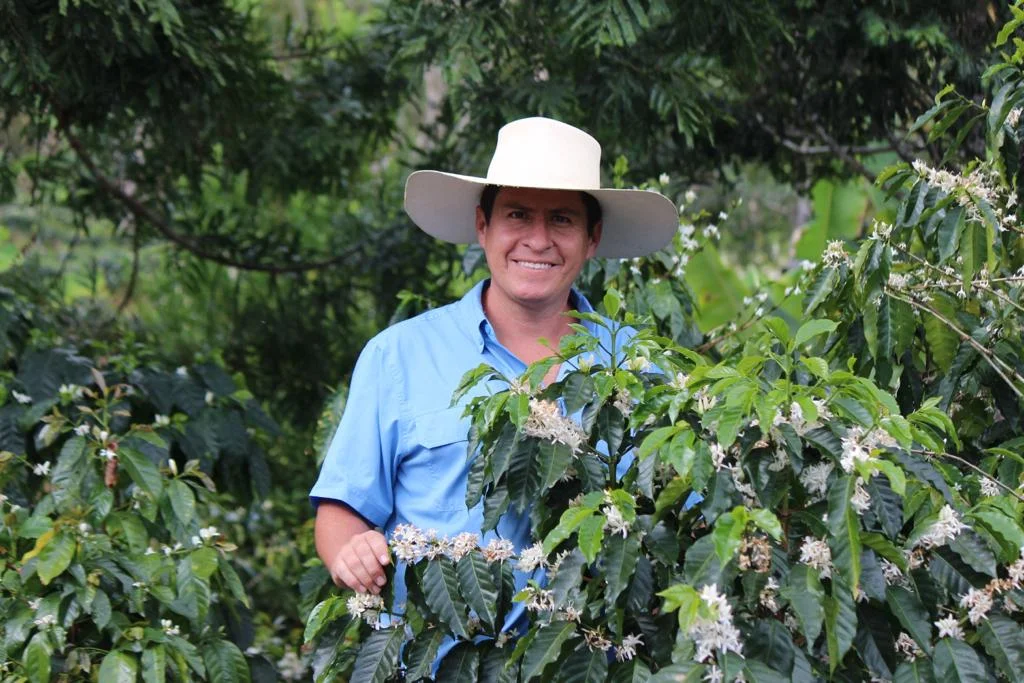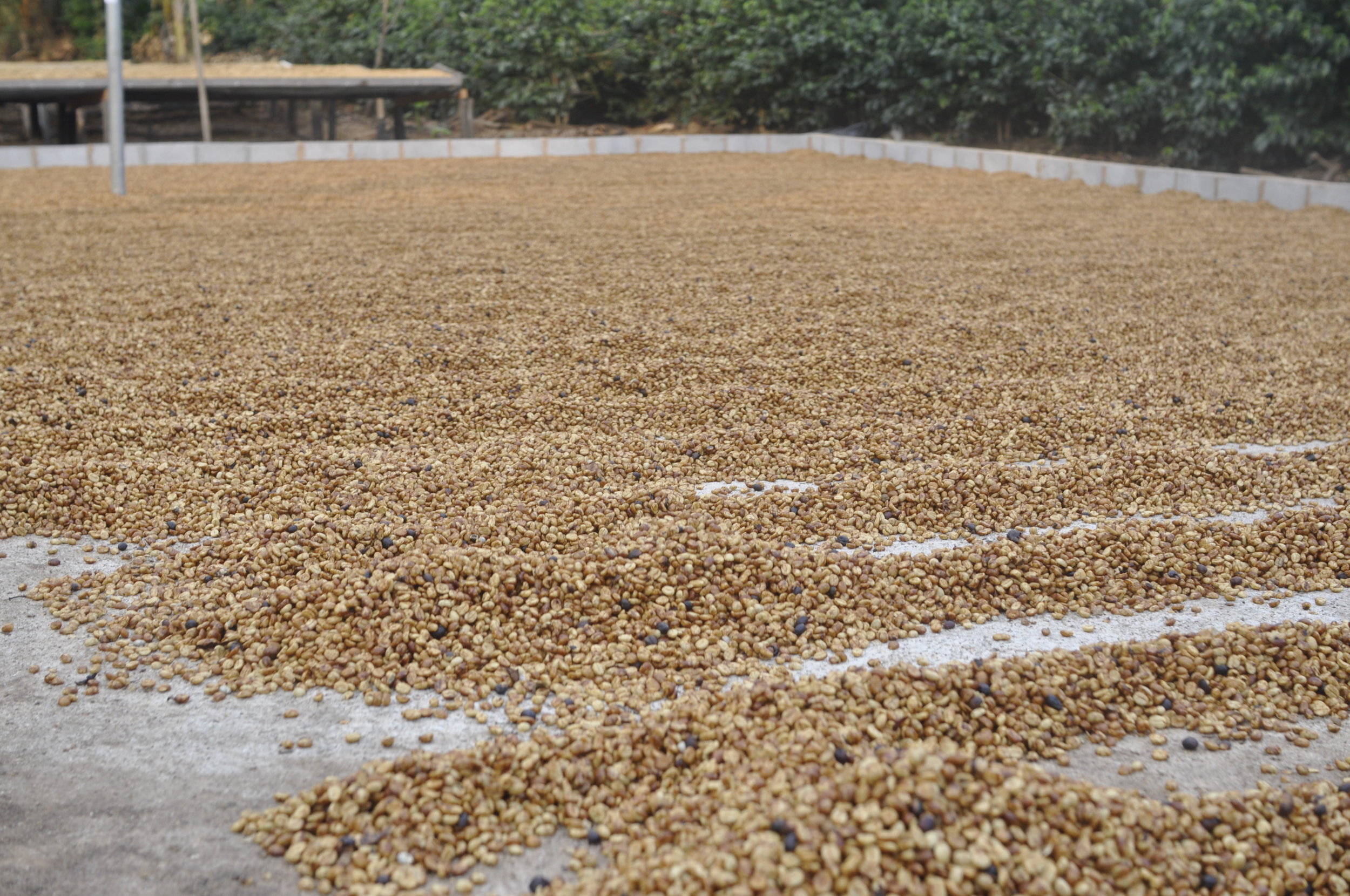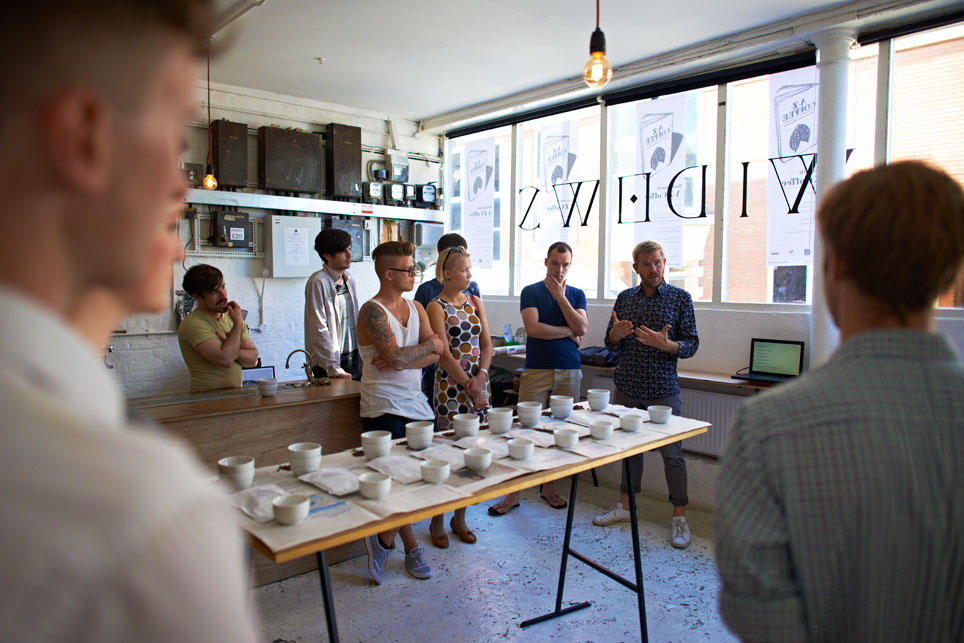Cuppings, Brew Bar featuring your favourite roasters across Europe & more
Producer Profile: the Bonillas of La Loma & Don Mayo
Farm: La Loma
Owner: Hector Bonilla
Region: Tarrazu
Micro Region: San Francisco de Leon Cortes
Micro mill: Don Mayo
Altitude (masl): 1850
Varietal: Red Catuai
Process: Fully Washed
About
Hector and Pablo Bonilla, owners of the La Loma farm, are also the father and son team behind well-known and widely recognized Don Mayo micro-mill. For several years, this family has been producing some of the finest coffee coming from Costa Rica. The mill processes coffee cherries from several neighboring farms in the increasingly infamous Tarrazu region and in 2009 the micro-mill was behind the production of the winning lot.
La Loma is located at 1800 masl and the Bonillas are well acquainted with our lot preferences based on our long-standing relationship with them. We choose “fully washed” coffees from La Loma because we believe it best represents the varietals grown at La Loma most faithfully. In the fully washed process, the seeds are removed from the skin, pulp and mucilage and are then dried on perforated mats, or directly on to cement, in order to dry slowly under constant raking and further selection process. Since coffee does not ferment in this process, there is one less variable to take into account that could lead to otherwise uneven drying and potentially compromised quality. We find that the lots produced at La Loma are very clean and refreshing.
Don Mayo Coffee Mill was established in 1994 and Héctor Bonilla Cruz is the general manager and founder of Don Mayo. Mr. Bonilla was the general manager of Cooperativa de Caficultores de Llano Bonito R.L. from 1992 to 1998, where, amongst other things, he incorporated the "Fair Trade" market and the beginning of direct sales of the cooperative’s coffee to European and North American clients.
The Bonillas use agricultural practices taken from research-based evidence; interventions that include best practice of soil treatments, shade organization, and coffee varieties. These practices are based primarily on the use of varieties of coffee that have been proven to best match the agroecology of the farms, soil maintenance without the use of agrochemicals, and the use of the controlled shade to incorporate organic matter into soil.
Care of the Bonilla plantations are worked in a personal way: the members of the Bonilla Solis family take care of the plantation themselves and supervise each one of the processes. This allows a more meticulous care of the soils, plantations and varieties of coffee. The family oversees every aspect of plantation management, including pruning, fertilizing and cleaning of the plantations. The family also participates in the milling process, in order to assure a quality product.
In 2005, Don Mayo began the renovating the mill including the addition of more sun drying patios, repainting of the machinery, construction of silos for storage, and mounting another mechanic dryer. These new facilities have been utilized since the 2006-2007 season.
In 2005, as a result of the great acceptance of their coffee and its price among toasters, the decision to continue with the project was made. For such purpose, they proceeded to begin the construction of a totally renewed mill. This included adding more sun drying patios, repainting machinery, constructing silos for storage, mounting another mechanic dryer; all of these to enlarge the processing plant and to have it ready for the 2006-2007 crop.
Producer Profile: Rivera family & Puente Tarrazu
Farm: La Pena
Producer: Mr. Rodolfo Rivera
Region: Tarrazu
Micro Region: Santa Cruz de Leon Cortes
Micro mill: Puente Tarrazu
Altitude (masl): 1650
Varietal: Caturra
Process: Yellow Honey
About
Tarrazu is one of the best areas in Costa Rica for coffee cultivation. In addition to optimum soil and climate, the coffee producers in this region are known for producing excellent cherries. La Pena is located at 1650 masl and Puente Tarrazu is the name of the micro mill that processes the cherries from La Pena. Along with the Mendez, Rivera (another Rivera family) and Naranjo families, the Rivera family runs and processes all their coffees at Puente Tarrazu.
At Puente Tarrazu, cherries are processed using the “yellow honey” method – a method similar to how “pulped natural” coffees are processed in Brazil. In the honey method, the fruit skin is removed from the seeds/beans, but the pulp remains. This highly sugary material, when handled properly, adds sweetness to the coffee that translates into more sweetness in the cup. Without careful handling, however, this sweetness can overpower a coffee’s clarity and elegance. The Puente Tarrazu team has been perfecting this processing technique, with the result that the coffees processed at the mill are elegant, sweet and transparent.
Producer Profile: Hernan Solis & Helsar de Zarcero
Farm: Solis
Owner: Hernan Solis
Region: West Valley
Micro Region: Llano Bonito Naranjo
Micro mill: Helsar de Zarcero
Altitude (masl): 1700
Varietal: Villa Sarchí
Process: Fully Washed
About
Every time we meet with Mr. Solis, we are impressed with his eagerness to do whatever it takes to produce great coffee and are humbled to see all the work that is required in order to achieve the quality the farm produces. "Solis" is located in Naranjo, West Valley, at about 1700 masl. Once coffee cherries have been harvested, they are taken to Helsar for processing, which is located in the same neighborhood. Processing is vital to achieving clean and delicious coffee. The Helsar mill is also committed to being carbon neutral, and is certified as such.
Helsar is one of the most successful and well-regarded producers of specialty coffee in Costa Rica, as the result of the partnership between Ricardo Perez Barrantes and brothers Marvin and Felipe Rodriguez. Both Villa Sarchi Solis and Helsar are exemplars of excellent and forward thinking producers. We believe that the Villa Sarchí species is particularly interesting because it developed in Costa Rica and adapted to the climate and growing conditions unique to Costa Rica’s coffee regions. This varietal is now known for its great freshness and refreshing juiciness, which reinforces our belief that Villa Sarchí and the microclimates of the farms delivering to Helsar are made for one another.
The Helsar mill processes for over a dozen growers (including the production of the owners’ own farms). Each coffee is processed separately and to the exacting standards of each grower. The patios at Helsar are covered, in order to dry coffee more slowly (heat is increased and the covering prevents rain damage). In line with sustainability considerations, the mill uses the latest in low impact aqua pulping machinery. Ricardo Pérez Barrantes has exhibited a broad understanding of the effects that pulping, fermentation, and drying have on coffee. Helsar’s willingness to work closely with buyers, combined with Ricardo’s skills as a processor, allow Helsar to present amazing coffees year-to-year.
London Centrals Cupping: Thursday 27th September
After the overwhelming success of our last London cuppings, we have decided to come back and present our latest coffee gems in the shape of Honduras, Costa Rica and Panama (Geisha).
We will be hosted by the wonderful people at Prufrock coffee on Leather Lane and will be joined with a skype link to the Collaborative founder Robert Thoresen who will introduce us to the coffees and regions and lead the discussion after cupping.
Date: Thursday 27th September
Time: 5pm
Location: Prufrock Coffee, 23-25 Leather Lane EC1N 7TE
The timings are as follows:
16.45 Arrival
17:00 Introduction to the coffees with Robert Thoresen via Skype
17:30 Cupping Honduras, Costa Rica & Panama Geisha
18:30 Discussion including Robert via Skype
19:00 Ends
"Micromills of Costa Rica and Best of Best of Panama" cupping
Hello Good Coffee People!
Last Friday Lars Huse, coffee lover and illustrator extraordinaire, released "Coffee A-Z" - a delightful little book filled with coffee information and accompanying illustrations. As the title succinctly describes it, the book informs and visualizes the world of coffee according to Lars. The event was held at Protein by DunneFrankowski, a minimalist coffee-bar-within-art-gallery space. Prior to the festivities, Robert hosted a cupping with a focus on micromills in Costa Rica and the best of Best of Panama.
To provide you with a bit of background on the Costa Rican coffees, Robert has been partnering with Exclusive Coffees over the last several years to first establish relationships and then buy coffee from quality-focused farms and micromills. Some of these micromill partners were represented at this cupping: Helsar de Zarcero, Don Mayo, Herbazu and Puente. Our approach within each country we buy from is focused and targeted, so when we met with Francisco and Juan Ramòn of Exclusive to discuss present and future strategy, we decided that rather than offer our customers "everything", we would focus on a handful of micromills and a handful of farms whose coffee is processed within each micromill. This allows for better relationship building, easier and more transparent communication and for better planning for future seasons.
So what did cuppers think of the coffees presented? 9 coffees were cupped and there were several varieties presented from each micromill. Sometimes Villa Sarchi presented more intense acidity but the Caturras also proved citrusy. The standout on this table came from the El Sur farm from the Puente micromill - this coffee had a lot of acidity but it was nicely balanced with sugary sweetness.
From the Best of Panama auction, we selected what we deem to be the "cream of the crop" from all three categories (i.e. geisha, natural, traditional) including natural and washed processed caturra, natural and washed geisha, washed pacamara and natural catuaì. Representative farms included Mama Cata, Los Lajones, Kotowa, Don Julian, Don Tito and Santa Teresa. There was some lively discussion about this table due to the varietals, processes and regions represented.
Many of you know about the Jaramillo farm located in Boquete and owned by the Peterson family. The geisha produced on this farm is well-known for being delicate and floral with prominent lemon citrus and jasmine flavours - people have come to love these attributes and it has put this farm and region on the map and the Petersons now hold their own successful auction. This year's geisha winner also presents the above-mentioned attributes but it comes from Volcán, a region not as ubiquitous for this varietal and these flavour characteristics.
Another topic that prompted discussion is the processing debate surrounding the geisha varietal. Does natural processing "cover" or "hide" the natural attributes of geisha? In the case of the winner from the "naturals" category, Don K from the Kotowa farm, no, natural processing does not take away from the elegance and cleanliness of the coffee. In the case of the second place winner, from Mama Cata, the natural process is more evident but the coffee is still lovely. Many of the 20 cuppers chose this one as their favourite.
And so, another interesting cupping with the London coffee community has come to an end. Thanks to all who came out to participate and to Lars and DunneFrankowski for providing an event and venue for this. Hope you enjoyed!
London Cupping, May 18 - the lineup
Hello London Coffee! Hope you're ready and excited to cup some fantastic coffee today. Here is the lineup, organized by origin, varietal, then process.
Table #1: Highlights from Central America
COSTA RICA, various mills & regions Helsar de Zarcero mill, Arce, Caturra, washed Herbazu mill, Villa Sarchi, washed Herbazu mill, Caturra, red honey
GUATEMALA, Buena Vista mill, Antigua region Hunapu, lot #1, blend Bourbon, washed Hunapu, lot #3, blend Bourbon, washed Felicidad farm, Bourbon, washed Potrero farm, Caturra, washed
HONDURAS, San Vicente mill, Santa Barbara region Juan Pablo Cruz, prod. Pacas, washed Castellanos, prod. Pacas, washed Nelson Ramirez, prod. Yellow Catuaí, washed Mario Moreno, prod. Pacas, washed Miguel Moreno, prod. Pacas, washed Amado Fernandez, prod. Yellow Catuaí, washed
Table #2: Best of...Best of Panama 2012
PANAMA, various producers/mills, Chiriqí region Duncan Organic farm, Caturra, washed (BoP #1) Don Julian farm, Pacamara, washed (BoP #2) Elida farm, Catuaí, washed (BoP #4) Elida farm, Catuaí, honey (BoP #5)
Los Cantares farm, Geisha, washed (BoP #1) La Milagrosa farm, Geisha, washed (BoP #2) Rojas farm, Geisha, washed (BoP #3)
Don K farm, Geisha, natural (BoP #1) Mama Cata farm, Geisha, natural (BoP #2) Casa Ruiz farm, Baby Geisha, natural (BoP #3)
Table #3: Highlights of natural processed coffees from El Salvador
El Salvador, various mills & regions Presented by Graciano Cruz, HiU
May 10 Cuppings in Gothenburg
Last Thursday Da Matteo roastery graciously hosted Collaborative cuppings for roasters interested in buying incoming coffees from Honduras and Panama. Since Giancarlo was also in Sweden at the time, Virmax took the opportunity to present on varietals in Colombia - specifically in the Santander, Valle del Cauca and Huila regions. El Roble is a state-of-the-art farm Kaffa started buying from last year and during this cupping, we presented three varietals from this farm (caturra, bourbon and typica), as well as a geisha from Cerro Azul Estate and a caturra from Omar Viveros' farm.
In attendance were representatives from Åre Kafferosteri, Johan & Nyström, Kahls kafferosteri, Dear Coffee, I Love You, Coffee and Memories, First Degree Coffee and Kaffemaskenin. From Santa Barbara in Honduras, 18 lots were cupped; 6 lots from the Los Angeles, Helsar and Don Mayo Mills in Costa Rica were selected; 1 lot each from the Yukro and Hawa Yember washing stations in Ethiopia were sampled; and finally, a variety of coffees from the Don Pepe, Lerida and Esmeralda farms in Panama were presented.
In general, cuppers were very excited about the Honduran and Ethiopian lots and felt that the Costa Rican lots were very clean but perhaps lacking in distinctness and character, in comparison to some of the others. Also of interest, and leading to much discussion, were the differences in cup profiles of the different varietals coming from El Roble, as well as the naturally processed geishas from Panama. Cuppers felt the Honduran coffees presented cleanly, distinctly (i.e. varietals as well as locations), with many exotic fruit notes, intensity and sweetness.
With respect to the geishas, we decided to dedicate a table to coffees from Esmeralda, specifically from the Jaramillo farm. Back in 2006, Robert asked the Petersons to begin separating lots from different areas of Jaramillo and year after year, he has preferred coffee from "Mario's area" (Mario is one of the people who live on this part of the farm). Even more specifically, Robert has cupped at various times this year and is most interested in pickings from February and March.
So, based on feedback we've received from last Thursday's cuppings in Gothenburg and in addition to prior organizing, we are in the process of finalizing shipments from Honduras and Panama. To allow for further contribution, we are hosting a cupping in London this Friday at Prufrock so that UK roasters can participate. News from this event to follow...
Until then,
Melanie




















